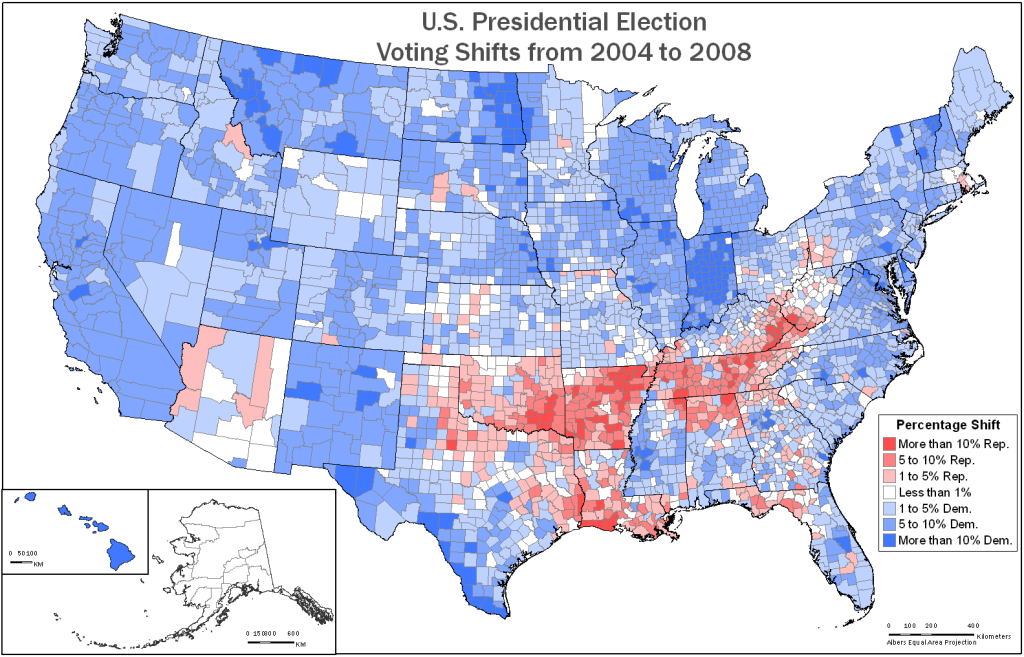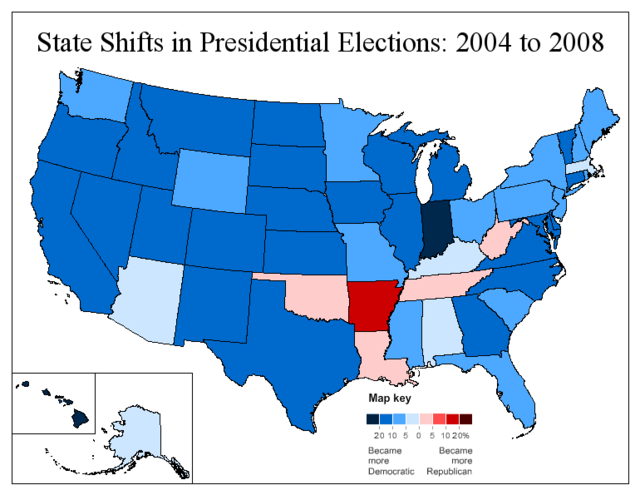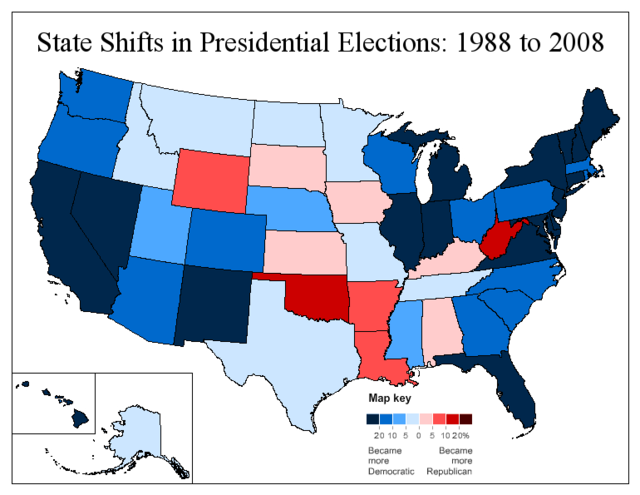• CT-Sen: It’s a rumor that’s been going around for a few weeks that seemed ridiculous, but it only seems to be getting louder, so it’s worth a mention: Ralph Nader is considering a run for the Senate in Connecticut under the Green Party’s banner, and is gauging grass-roots support for a race. The knee-jerk reaction is that this is one more piece of bad news Chris Dodd doesn’t need, but it’s worth considering that Nader may actually help Dodd more than hurt him, by diluting the pool of anti-Dodd votes, giving an option for Dems and indies who are specifically anti-Dodd and anti-bankster, other than voting for the Republican.
• IL-Sen: Freshman Rep. Aaron Schock gave his endorsement to Rep. Mark Kirk in his quest to win the GOP Senate nomination. People are treating this like it boosts Kirk’s conservative bona fides, but Schock has turned out to be more of a low-key, establishment player since getting into the House than his loose-lipped statements during his campaign would have suggested.
• KY-Sen: Rand Paul and the NRSC seem to be in a standoff, over the same old issue, whether or not the NRSC plans to endorse in the primary. Paul was spreading the word last week, based on conversations with the NRSC, that the NRSC would not endorse, but spokesperson Brian Walsh now says the NRSC doesn’t “anticipate” endorsing but reserves the right to do so.
• MA-Sen: Rep. Michael Capuano got an endorsement from one of the deans of Bay State politics, former Gov. (and presidential candidate) Mike Dukakis. However, he might be overshadowed a little by Alan Khazei, who’s attracted little attention so far but seems to be closing strong, if the last Rasmussen poll is any indication. Khazei snagged endorsements from both the Boston Globe and retired Gen. Wesley Clark.
• NC-Sen: Campaign Diaries managed to snag an internal polling memo for the Elaine Marshall campaign, which leads me to wonder why the DSCC is stiff-arming her and still pining for former state Sen. Cal Cunningham to get in the race. Marshall leads with 42% in the primary, with attorney Kenneth Lewis at 7 (including 14% of African-Americans) and Cunningham at 5. At some point, the DSCC’s tepidness about her, if it doesn’t change, is going to start affecting broader perceptions of her — likely to create a fundraising vicious circle of not being able to raise funds well because she’s not perceived as not being able to win because she can’t raise funds well. The poll was conducted by PPP, although Marshall has previously used Lake Research as her pollster.
• NY-Sen-B: Rasmussen took their first look at a Rudy-centric Senate race in New York, finding Rudy Giuliani beating Kirsten Gillibrand 53-40 (a very similar margin to last week’s Marist poll). Giuliani has 63/33 favorables, while Gillibrand is at 46/41 (this has to be the best-known Gillibrand has ever been, but one of Rasmussen’s many quirks is to show everyone as being well-known). The New York Post also has the scoop on a Republican who seems likelier to run (although it’s on the gossip page rather than the politics section!): Port Authority Commissioner Bruce Blakeman is considering a running for the Republicans. Blakeman lost the 1998 state Controller’s race to Carl McCall; also, his ex-wife is now dating Paul McCartney, which is apparently Page Six’s angle on all this.
• UT-Sen: Here’s an interesting ploy: Rep. Jason Chaffetz (rumored as a potential Senate candidate) is taking a highly visible stand against the Obama administration’s decision to deploy additional troops to Afghanistan, saying it’s time to bring them home and that he’s opposed to “nation building.” That puts him up against the party orthodoxy, but it also leads to the question of whether Chaffetz is a bit of an outlier here or if the movement conservatives are going to be moving in more of an isolationist direction heading into 2012 (and whether that’s because of their paranoid nativist worldview, or just because it gives them one more thing to oppose the President on).
• AL-Gov: Two endorsements in the Alabama governor’s race, where there are heated primaries on both sides. Mitt Romney has endorsed Treasurer Kay Ivey, perhaps as payback for chairing his Alabama campaign but also a potential thumb-in-the-eye to the religious right, who are naturally supporting Roy Moore in the race. On the Dem side, Sam Jones, the first African-American mayor of Mobile, endorsed Rep. Artur Davis.
• MA-Gov: Rasmussen threw in some gubernatorial numbers to their sample last week of the Senate special election primary, and they continue to find that incumbent Dem Deval Patrick has the edge. It’s a little narrower than their last poll or Suffolk’s recent poll — Patrick leads independent Tim Cahill and Republican Christy Mihos 32-28-26 and leads Republican Charlie Baker and Cahill 33-28-25 — but it still shows Patrick benefiting from Cahill splitting the anti-Patrick vote.
• MI-Gov: A poll of the Republican field in the Michigan gubernatorial race by Mitchell Research for the Detroit News finds a small lead for AG Mike Cox. Cox leads Rep. Peter Hoekstra 27-24, with 12 for Oakland Co. Sheriff Mike Bouchard and 3 each for state Sen. Tom George and businessman Rick Snyder. The poll also finds Cox beating Democratic Lt. Gov. John Cherry by 16 points in the general, although specific numbers aren’t reported for some reason.
• NY-Gov: Another brave Republican is considering taking on the gubernatorial race: Emil Henry Jr. He’s got just the right resume for these troubled times: He was assistant Treasury Secretary in the Bush administration, and before that, an executive at Lehman Brothers. Ex-Rep. Rick Lazio is already in the GOP field.
• UT-Gov: Democratic Salt Lake County mayor Peter Corroon is sounding more like a candidate for governor, in next year’s special election against appointed GOP incumbent Gary Herbert. A recent Deseret News/KSL-TV poll finds Herbert leading Corroon 56-32. Corroon actually sounds encouraged by these numbers; considering it’s Utah, I suppose they could be much worse.
• CA-45: More Mitt Romney news, and it’s a tea leaf that the GOP is concerned about defending Mary Bono Mack in the 45th even as they go on the offense in swing districts elsewhere: Romney will be appearing at a Bono Mack fundraiser in the district on Jan. 9.
• FL-19: Charlie Crist moved the date on the general special election to replace resigning Rep. Robert Wexler, which had been originally scheduled Apr. 6. He moved it to Apr. 13, so it wouldn’t conflict with Passover (a problem in this heavily Jewish district).
• GA-08: Democrats dodged a bullet in the 8th, where Rep. Jim Marshall may get the easiest ride of any Dem in a dark-red southern district next year. Republican State Sen. Ross Tolleson said he’d like to run for Congress at some point, but this won’t be the year. Tolleson threw his support to Angela Hicks, a businesswoman who’s one of several little-known candidates in the hunt.
• GA-12: It’s official: former state Sen. Regina Thomas will be challenging Rep. John Barrow in the Democratic primary next year. Barrow is unusual among the most problematic Blue Dogs because he’s in a district with a Democratic-leaning PVI and thus one where a better Dem could still win a general election (although it’s one where African-American voting tends to fall off during off-year elections). Thomas piqued some netroots interest last year because of this unusual circumstance, but between a late start, a low-visibility strategy focused on word-of-mouth through black churches, and an Obama endorsement of Barrow, she only cleared 24% in last year’s primary. We’ll have to see if the earlier start helps this time.
• IA-02: Mariannette Miller-Meeks, who came within 18 points of Rep. David Loebsack last year thanks to a lot of help from those meddling Ophthalmologists, says she’ll try again in 2010. She’s not alone in the GOP field, though; interestingly, she’s up against two guys who both ran for Senate in 2008, businessman Christopher Reed (who made it through to the general against Tom Harkin, only to get flattened) and Steve Rathje (who lost the primary).
• NH-01: I don’t know if this is a case of once-highly-touted Manchester mayor Frank Guinta losing momentum, or just Some Dude with delusions of grandeur, but businessman Richard Ashooh is filing exploratory paperwork to run in the GOP primary. The winner faces Democratic Rep. Carol Shea-Porter in what’s likely to be a close race.
• TN-06: The GOP is trying to cajole a state Senator into getting into the race against long-time Democratic Rep. Bart Gordon in the once-swingy, now R+13 6th. Jim Tracy says he’s strongly considering the race. There’s one catch: Rutherford County Republican chair Lou Ann Zelenik is already in the race, and has the ability to self-fund.
• TX-17: Here’s a Dem in a dark-red district who caught a big-time break on the recruiting front, though: Rep. Chet Edwards won’t be facing state Sen. Steve Ogden, as had been rumored. Ogden announced that he’ll run for another term in the Senate instead. (Thanks to the small size of Texas’s Senate, Ogden actually has more constituents than Edwards.) 2008 candidate Rob Curnock, who came within single-digits of Edwards, is running again, though.
• GA-Super. of Education: Georgia’s Republican Superintendent of Education, Kathy Cox, is persisting in running for re-election next year despite having recently filed for bankruptcy to escape $3.5 million in debt. The story gets even weirder: this is despite Cox having won $1 million on “Are You Smarter Than a 5th Grader?” — despite having pledged to give that money to charity, her creditors are now coming after that money. (Is there any precedent for a statewide elected official appearing on a game show?) Cox now faces opposition in a GOP primary from former state Rep. Roger Hines.
• Nassau Co. Exec: The counting of absentee ballots in Nassau County is finally winding down in this month’s most drawn-out election, and it looks like Republican challenger Ed Mangano may actually succeed in upsetting incumbent Dem Tom Suozzi. Mangano leads by 217 with few ballots remaining. Even if the count concludes today, it won’t be the last word, as legal challenges to a number of votes will still need to be resolved.
• Mayors: New Orleans mayoral candidate James Perry is getting a jump on political advertising, and his ad is certainly attention-grabbing too. It includes a variety of bleeped-out profanities as local residents (or actors portraying them) let everyone know how they feel about career politicians.
• NY-St. Ass.: Assemblywoman Dede Scozzafava says she’s going to stay a Republican, despite losing her leadership position in the wake of her imploded House campaign. Despite her many impure thoughts, she says she’d still clock in at 7 out of 10 on the RNC’s new purity test.
• Redistricting: CQ Politics sits down with filmmaker Jeff Reichert, whose upcoming documentary on redistricting is slated for release next year. I’ve been emailing with Jeff about this project for a while now, and it looks very interesting. (D)


